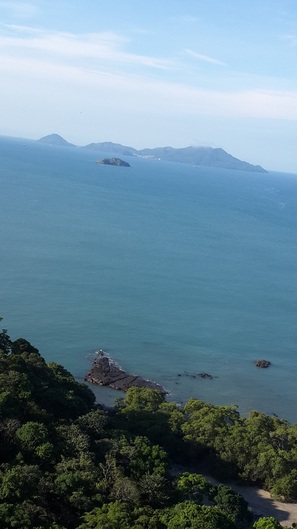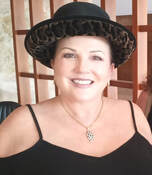
We took our time paddling around the island, basking in the enjoyment of being so close to dozens of pelicans in their natural environment. When we turned around, we realized how far we had paddled from the shore of Playa Bonita where we live. I estimated we were about 4 miles from shore, which I later confirmed with Google Maps was 3.65 miles. (The photo of the first little land mass is the little island we rowed to.)
If we were taking a brisk walk, we could get there in about an hour. But the current and the choppy water were working against us. With both of us paddling aggressively, we were going about as fast as a ninety-year-old with a walker. At this rate, we wouldn't get back for another two or three hours.
I had brought some spray-on sunscreen and a bottle of water, thinking we would be gone an hour. I'd used the last of the sunscreen and we were halfway through the water. I started fantasizing about a bottle of wine, a crusty loaf of bread, and a hunk of cheese. Why hadn't I thought to pack a picnic basket of food? Oh yeah, we were only supposed to be gone an hour.
Shortly after realizing our tired bodies had a long way to go before getting back to shore, a small fishing boat appeared on the horizon. My wine-drenched fantasy now included that boat stopping for us, but I'm an American. We got ourselves into this mess, we would get ourselves out. My Brazilian sweetheart doesn't have the same sense of individualism that Americans have. He has no problems asking for directions, and he had no problem using his life jacket to flag down the fishing boat. As they approached, I was embarrassed. They had better things to do than to rescue us.
When the boat approached, we saw that there were two men on board. A small older man at the back of the boat working the engine, and a strapping younger man standing in the front who had a shirt wrapped around his face in a way that made him look like--can I be honest?--a terrorist. When he saw the ultra-white Gringa with a big hat at the front of the kayak, he unwrapped his shirt from his face to look less threatening, which I was immediately grateful for.
A quick conversation in Spanish ensued that I couldn't follow, and I was both hopeful and apprehensive. This was not a deep sea fishing boat, nor was it a sleek speed boat. It was a dented, rusted tiny little skiff that looked like it had been around for decades. Within seconds, the capable fishermen had us tied us to the back of their boat with an intricate knot, and they began to tow us back to shore.
The older man, whom I referred to in my head as the captain, used his cell phone to take a photo of us being towed behind his boat. I've had enough photos taken in my life to know which photos will be flattering and which will not. I imagined how that photo would look... my pale skin red from the sun, my legs splayed open on the front of the kayak, my water-soaked sun hat dripping onto my face, my horrid orange vest making me look like a neon Michelin Man, and a look of terror on my face as we crested each new wave. Hmmm. Definitely not a photo I'd want on Facebook. The fisherman laughed as he took the photo, so I knew it was probably even worse than I imagined.
During the first ten minutes, the "captain" watched us attentively and kept his speed down. But then he became bored. The little boat sped up little by little, and he stopped making sure we were in the center of his wake. That's when I realized that kayaks weren't designed to be towed by motorboats, especially not in the open sea. On three separate occasions I thought we were going to capsize, but somehow we righted ourselves each time. I tried to stay as still as a statue during the 30 minutes it took to tow us back, even though my ankles were closer to my ears than to a normal sitting position due to the kayak's nose rising high in the water. I kept thinking that as uncomfortable as I was, it was far better than rowing for another few hours!
When we got to the edge of the bay, the fishermen stopped the boat and started to untie us. Knowing that we'd still have another 30-minutes of hard paddling from that point, we said the magic word that would get us all the way to shore...propina. (Propina means "tip" in Spanish.) Their faces lit up with smiles and we kept going. The Playa Bonita Bay doesn't see many motorized boats, and we could feel the stares of every person along the shore as our simple fishing boat towed us to shore.
When they finally untied us, we were literally just a few feet from shore. I would love to say I hopped out of the kayak with ease and grace, but the hours in the kayak in an unnatural position had locked my hip flexers, and I flopped out of the kayak with all of the grace of a beached whale.
My fiancé raced to our apartment to get some money for a tip. While there, he packed a bag of sandwiches, chips, fruit and sodas to give to our rescuers. They were so thrilled to get the food and the equivalent of a day's wages as a tip, that they gave us a small bag of langostinos they had caught. (Langostinos are a cross between a large shrimp and a lobster.)
It was my idea to give them a tip, but I'll be honest... I wouldn't have thought of giving them food. Even though I've lived in Panama for a few years, I still don't think like a Latin.
As soon as I got back to my apartment, I poured myself a glass of wine and took a lengthy shower. When I no longer smelled like a fish, I cooked the fresh langostinos in a white wine and butter sauce. Even though I'm a writer, I don't have the words to describe the buttery, succulent perfection. I'd never tasted just-caught seafood before, but I now know what I've been missing. Before our meal was finished, my fiancé called our new friends and asked when we could buy more. Yes, with the exchange of food our unexpected rescuers had become our friends. So not only did we have an ocean adventure, but we made some new friends. That's the Latin way.


 RSS Feed
RSS Feed